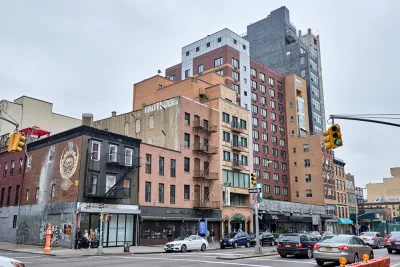A new paper published by the Joint Center for Housing Studies of Harvard University raises the stakes of the discussion about exclusionary zoning and its role in the ongoing housing affordability crisis in the United States.

Michael Stegman explains new writing on the subject of exclusionary zoning that makes an argument for overturning the dominant practice of 20th century zoning as the civil rights issue of the current era.
Stegman notes that he recent formation of the White House Council on Eliminating Regulatory Barriers to Affordable Housing is only the most recent version of a recurring series of political efforts at the federal level, consistent despite political party in recent adminsitrations:
Though their respective contexts may vary according to the political economy of the time, their centers of gravity are strikingly similar. Each is based on the proposition that unnecessary and exclusionary land use regulations drive up production costs and drive down housing supply, worsening an already severe affordability crisis…
Stegman also notes that previous efforts to reform exclusionary zoning have resulted in more talk than action. Stegman's new "Industry Perspectives" paper argues that the reason for the failure to reform local zoning practices is caused by underestimating the national implications of status quo.
The paper, titled "Eliminating Exclusionary Land Use Regulations Should Be the Civil Rights Issue of Our Time," therefore cites "several recent state and local zoning reforms that have the potential to make significant local impacts." Still, those local efforts reflect only a patchwork, and "focusing exclusively on isolated local reforms fails to recognize that the collective impact of decades of layering exclusionary zoning and land use controls is not just higher housing prices."
Instead of these local reforms, Stregman suggests the federal government should treat exclusionary zoning like a national problem, even suggesting constitutional means.
FULL STORY: ELIMINATING EXCLUSIONARY LAND USE REGULATIONS SHOULD BE THE CIVIL RIGHTS ISSUE OF OUR TIME

Analysis: Cybertruck Fatality Rate Far Exceeds That of Ford Pinto
The Tesla Cybertruck was recalled seven times last year.

National Parks Layoffs Will Cause Communities to Lose Billions
Thousands of essential park workers were laid off this week, just before the busy spring break season.

Retro-silient?: America’s First “Eco-burb,” The Woodlands Turns 50
A master-planned community north of Houston offers lessons on green infrastructure and resilient design, but falls short of its founder’s lofty affordability and walkability goals.

Test News Post 1
This is a summary

Analysis: Cybertruck Fatality Rate Far Exceeds That of Ford Pinto
The Tesla Cybertruck was recalled seven times last year.

Test News Headline 46
Test for the image on the front page.
Urban Design for Planners 1: Software Tools
This six-course series explores essential urban design concepts using open source software and equips planners with the tools they need to participate fully in the urban design process.
Planning for Universal Design
Learn the tools for implementing Universal Design in planning regulations.
EMC Planning Group, Inc.
Planetizen
Planetizen
Mpact (formerly Rail~Volution)
Great Falls Development Authority, Inc.
HUDs Office of Policy Development and Research
NYU Wagner Graduate School of Public Service




























